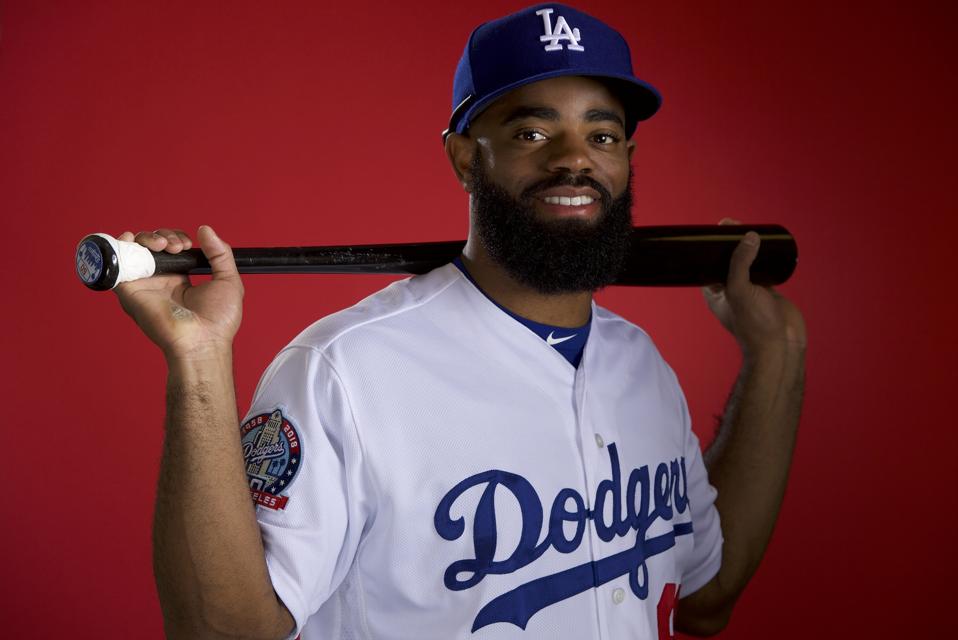We hear and read so many stories about the cold heart of professional sports. This writer wrote one just last month. So when a major league organization does something altruistic, something unnecessary but kind, it necessitates reporting. With so much negativity in the world, it is important that we take note of these moments of generosity.
Last month, the Los Angeles Dodgers once again renewed the contract of Andrew Toles. It is the same process they have done for the past six years. The Dodgers don’t publicly discuss this decision, and they don’t look for any sort of accolades. They simply place Toles on the restricted list so he doesn’t take up a roster spot, and Toles gets another year of health insurance. Why do they do this?
Toles was drafted in the third round of the 2012 draft by the Tampa Bay Rays, and was released three years later after behaving erratically and threatening to hurt people. At the end of the 2015 season, on the recommendation of the Dodgers’ then-director of player development, Gabe Kapler, Toles signed with the Dodgers. At the time, Kapler told Bob Nightengale of The USA Today: “We knew Andrew experienced some personal challenges with the Rays when we signed him. We thought we could create a different environment that might allow him to thrive at the minor league level. There were a lot of people who cared for him and invested in him.” Little did Kapler know how true that statement would turn out to be.
Toles made his major league debut with the Dodgers in 2016. Between 2016 and 2018, he appeared in 96 games for Los Angeles, hitting .286 and accruing 1.9 bWAR. Toles was a force in the club’s 2016 NLCS loss to the eventual World Series champion Chicago Cubs, going 6-for-13, with a .467 OBP and a 1.082 OPS. Unfortunately, those 96 games, and that playoff appearance, were the sum total of Toles’ MLB career.
Toles spent part of the 2018 off-season working out in Los Angeles, then left for a trip, and never came back. He didn’t report to Spring Training in 2019. The Dodgers later learned that Toles’ family placed him in a mental health facility in January of 2019. He stayed less than two weeks, then disappeared again.
In February of that year, Toles got into a car accident that landed him in the hospital. It was during that hospitalization that he was diagnosed with bipolar disorder and schizophrenia. The Dodgers and Toles’ family kept the diagnosis private, simply stating he was away from the team for “personal reasons.”
But after his stint in the hospital, Toles took off again. His whereabouts were essentially unknown until June of 2020, when the police arrested a homeless man found asleep behind the Federal Express building at the Key West International Airport. His mug shot quickly circulated around the Internet, giving Toles’ family, his Dodgers’ family, and baseball fans the world over, a look at what had become of the once promising outfielder. At that point, he had been in and out of at least twenty mental health facilities since his first stay in Phoenix.
Toles’ plight is not uncommon in society at large, but it quite rare for a (former) professional athlete. Putting aside his baseball career, mental health issues left Toles without a home and without hope.
In 1986, The Baseball Assistance Team was formed by former Major League Baseball players “to confidentially help members of the Baseball Family who [a]re in need of assistance and with nowhere else to turn.” The organization is intended to serve as a bridge to help people get back on their feet. However, the group is only a resource to those who know about it, can find it, and have the physical or mental wherewithal to access it. Andrew Toles clearly did not and does not.
Further, in order to qualify for lifetime health insurance under the MLB collective bargaining agreement, a player must accrue a total of four years of service time. Toles is nowhere close. (Note: Simply by playing a single day in the big leagues, a player is eligible to buy into the player’s health insurance system, which is clearly not an option for Toles at this point in time.)
With multiple barriers erected between Toles and his potential recovery – or even just stability – the Dodgers elected to step in and step up. Los Angeles’ president of baseball operations, Andrew Friedman, originally drafted Toles when he was with the Rays, so he has a close and personal connection to the player and his family. And he was not and is not about to allow Toles to be adrift at sea with no lifelines tethering him to a potential better future.
So since 2019, each season the Dodgers renew Toles’ contract, put him on the restricted list, and make sure he has insurance coverage. Players on the restricted list do not accrue any additional service time, so Toles’ 96 days over three years are encased in amber, and he (most likely) will never have lifetime health benefits from MLB. But, no matter, he has something arguably better. He has angels in the outfield who make sure that one of their own is never forgotten, and always has a chance.
In a world that is increasingly harsh, in an industry that is typically unforgiving, what the Dodgers have done and continue to do for Andrew Toles is an act of benevolence that needs to be trumpeted.

